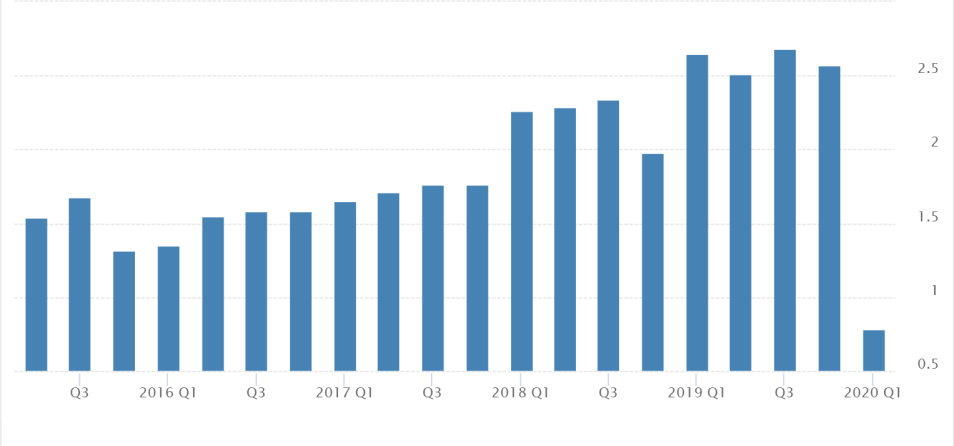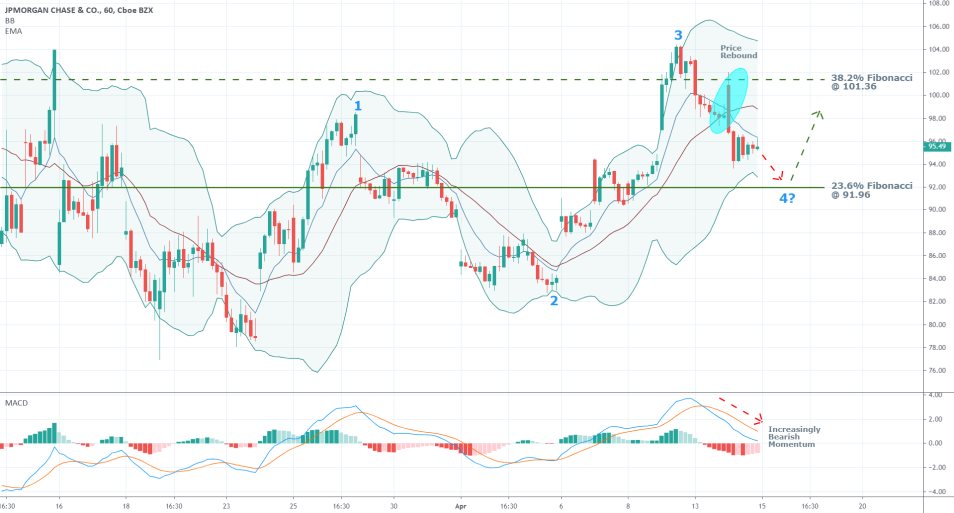JPMorgan Chase & Co.’s market capitalisation of nearly $300 billion makes it the biggest bank in the US, and essentially, one of Wall Street’s flagships.
This is why its earnings report from yesterday was highly anticipated by investors, who wanted to see whether JPM has managed to weather the initial risk from the escalating coronavirus crisis, and what the broader ramifications for the entire financial industry in the states would be.
The bank reported dismal net income for the first fiscal quarter of 2020 equalling $2.86 billion, which marked an enormous drop from the $8.52 billion that was reported for Q4 2019. In comparison, the net income for Q1 of 2019 was reported at $9.17 billion.

Consequently, JPMorgan Chase reported a considerable drop in its Earnings Per Share to $0.78 from the $2.65 that was reported for the same period last year. The delivered EPS data for Q1 2020 plummeted way below the consensus forecasts, which were projecting EPS of $2.49.
There is, however, a silver lining to JPM's poor earnings data, and that is the fact that the bank's net revenue remained relatively unscathed by the economic fallout at $29.06 billion. This marks a marginal drop from the $29.21 billion that was recorded for Q4 2019.
Arguably, the most important excerpt from the findings of the report is the confirmation of JPMorgan’s readiness to weather the still-evolving coronavirus crisis and to continue supporting the financial industry with its liquidity.
Jamie Dimon, Chairman and CEO, commented on the bank’s quarterly performance:
“The company entered this crisis in a position of strength, and we remain well capitalised and highly liquid. […] And JPMorgan Chase performed well in what was a very tough and unique operating environment - growing deposits in every line of business and providing loans as we extended credit and served as a port in the storm for our clients and customers. In the first quarter, the underlying results of the company were extremely good, however, given the likelihood of a fairly severe recession, it was necessary to build credit reserves of $6.8B, resulting in total credit costs of $8.3B for the quarter.”
The CEO’s commentary alludes to the bank’s efforts in hedging the risk of deepening recession by implementing the necessary measures to ensure enough liquidity for the foreseeable future in case that the situation continues to worsen in Q2.
JPM’s stock price fell by 2.74 per cent yesterday after the report was released, but the underlying market sentiment remains tilted to the north side due to the bank’s demonstrated resilience in the wake of this unprecedented economic crisis.

Trendsharks Premium
Gold is undergoing a correction, as investors take profits to offset losses from falling stock prices, impacting their margins. However, we anticipate a renewed wave of [...]
The Swiss stock market index is mirroring its global counterparts, such as Germany 40 and US100, experiencing a sharp decline following the announcement of new [...]
We’re analyzing the weekly chart to grasp the broader market trend. Over the past three years, the US30 index has surged by 17,000 points, often resembling a nearly straight [...]
Over the past week, the DAX has experienced a sharp decline, plunging by an astonishing 3,400 points. This downward movement is not isolated, as its international counterparts, such as the UK100 and US100, are also facing significant [...]
EURUSD recently formed a double top at 1.0930, signaling a potential trend reversal, and has since begun a correction. After a 600-pip rally since early March, a pullback at this stage is both expected and healthy. Given these conditions, we are placing a [...]
Since early March, EURJPY has surged nearly 1,000 pips, providing us with several excellent trading opportunities. However, as the rally matures, many early buyers are beginning to take profits, leading to a noticeable slowdown in the uptrend. On Friday, the pair formed a [...]
The AUDJPY currency pair continues to be dominated by bullish momentum, as multiple golden cross patterns reaffirm the strength of the ongoing uptrend. Despite this, we are witnessing a much-needed [...]
The EURAUD currency pair appears to be undergoing a trend reversal, signaling a potential shift in market direction. A notable technical development is the formation of a Death Cross on the chart, a widely recognized bearish indicator that typically suggests a [...]
After securing an impressive 200-pip profit last week, the EURJPY currency pair is now undergoing a southward correction, retracing some of its recent gains. Despite this temporary pullback, the Golden Cross remains intact, reinforcing our view that the overall trend continues to be [...]
The appearance of a Golden Cross in Silver strengthens our analysis that the metal is currently in a strong uptrend, indicating further bullish momentum in the market. This technical pattern, where the short-term moving average crosses above the [...]
This trade presents a considerable level of risk and can be classified as an opportunistic move based on recent price action. The GBPUSD currency pair has experienced a substantial bullish rally, surging by nearly 500 pips in a strong upward movement. However, after this extended period of appreciation, the pair is showing signs of a potential [...]
The anticipated Death Cross on the SMI20 appears to be failing as price finds strong support at the 23% Fibonacci retracement level. After testing this area, the index has shown bullish strength, printing several large green candles, signaling an increase in [...]
A Golden Cross has just appeared on the USDJPY chart, signaling a potential bullish move. This technical pattern occurs when the 20 period moving average crosses above the 60 period moving average, a widely recognized indication of increasing [...]
After 2 months of a down trend, we finally see some indications of price recovery for Oil. The golden cross, a historic buy signal, supports this [...]
For the past month, the German DAX40 has experienced a remarkable 10% surge, reflecting strong bullish momentum. Despite ongoing market volatility and frequent pullbacks, every dip continues to attract fresh buyers, reinforcing the [...]
Oil continues its downward trajectory, despite occasional pullbacks. The overall trend remains bearish, reinforced by multiple Death Cross patterns, a classic sell signal indicating further weakness. Adding to this bearish outlook, the critical [...]
Over the past few days, gold has experienced a sharp decline of more than $100. This downturn can be attributed in part to traders securing profits to manage their margins, which are under strain due to the significant drop in major indices. Currently, gold has fallen below the [...]
The NASDAQ 100 index is showing strong bullish momentum, as evidenced by the formation of a Golden Cross on the chart. This classic buy signal occurs when the short moving average crosses above the long term moving average, suggesting that upward momentum is [...]
The EURAUD currency pair has encountered a significant resistance level, failing to break above the critical 61% Fibonacci retracement level. This suggests that bullish momentum is weakening, reinforcing the case for a potential downward move. Given this technical setup, we favor entering a [...]
The UK100 is experiencing a remarkable rally! Over the past few weeks, the British stock market index has surged nearly 800 points. Each minor dip has attracted more buyers, fueling the bullish momentum. However, since last week, we’ve observed a slight [...]




















